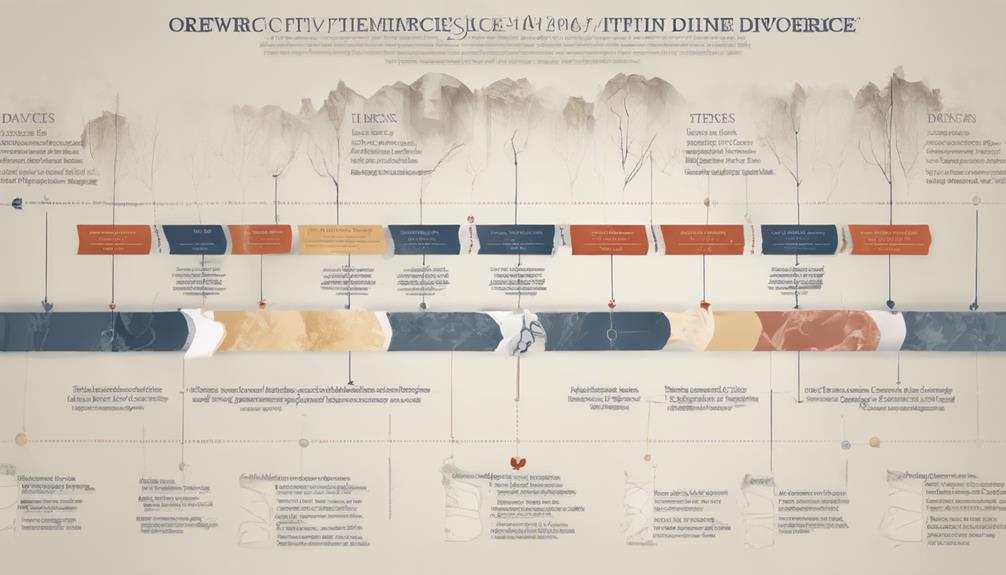Starting the journey of divorce is akin to sailing through unfamiliar territory, unsure of when we will finally reach the destination of closure.
The intricacies of the legal process, emotional complexities, and individual circumstances all interplay in determining the length of this passage.
Understanding the specific steps involved and the potential roadblocks along the way can provide clarity in navigating the turbulent waters of divorce proceedings.
Key Takeaways
- Initial steps like filing paperwork and serving petition set the divorce process in motion.
- Timely response, counterclaims, and addressing all issues ensure smooth progression.
- Temporary hearings and discovery aid in resolving urgent matters and sharing information.
- Negotiation, trial, and finalization steps determine the duration of the divorce process.
Filing the Initial Paperwork
When beginning the divorce process, filing the initial paperwork is a critical step that officially sets the legal proceedings in motion.
The first document to prepare and submit to the court is the Petition for Divorce, outlining the grounds for divorce and addressing key issues like child custody, support, and property division. This petition is pivotal as it signals the start of the formal process between the spouses.
Ensuring that the petition is accurately completed and meets all legal requirements is essential for a smooth progression of the case. It's imperative to address all necessary details meticulously, as any errors or omissions could potentially delay the proceedings.
Additionally, serving the filed paperwork to the other spouse is a crucial part of the notification process, as they have the right to be informed about the legal actions being taken.
Thus, filing the initial paperwork correctly is fundamental in initiating the divorce process effectively.
Serving the Divorce Petition

After filing the initial paperwork, the next critical step in the divorce process is serving the divorce petition, ensuring that legal documents are formally delivered to the spouse to notify them of the ongoing proceedings. Proper service is vital to make sure that the spouse is fully aware of the divorce proceedings.
Here are some key points to consider during this phase:
- Methods of Service: Service can be carried out by a process server, sheriff, or a third party over 18 years old.
- Proof of Service: It's essential to file proof of service with the court to progress with the divorce process smoothly.
- Potential Delays: Failure to serve the petition correctly can lead to delays in the divorce proceedings, so ensuring proper service is crucial.
- Importance of Formal Delivery: Formal delivery of the legal documents to the spouse is necessary to maintain transparency and keep all parties informed throughout this sensitive process.
Responding to the Petition
Upon receiving a divorce petition, promptly filing a comprehensive response within the court's specified timeframe is crucial to actively engage in the legal proceedings. When responding to the petition, it is essential to address each allegation by admitting or denying the statements presented. Failure to respond within the designated time frame may lead to a default judgment, putting the non-responding party at a disadvantage. Additionally, this is the opportune moment to include any counterclaims or cross-petitions if there are additional requests or claims to be made. Responding to the petition marks a critical step in the divorce process as it ensures that all pertinent issues are addressed, allowing the case to progress smoothly. By taking this step, the case moves forward, paving the way for subsequent stages in the divorce process.
| Aspects to Consider | Details | Importance |
|---|---|---|
| Filing an Answer | Admitting or denying allegations | Crucial |
| Default Judgment | Risk of not responding timely | Avoidable |
| Counterclaims | Including additional requests | Strategic |
| Case Progression | Addressing all issues | Fundamental |
Temporary Hearings and Discovery

As we navigate through the divorce process, one of the crucial stages involves addressing urgent matters through temporary hearings and engaging in the exchange of information and evidence in what's known as discovery.
- Temporary Hearings: These hearings address pressing issues such as child custody, visitation rights, and temporary financial support until a final divorce settlement is reached.
- Urgent Matters: Temporary orders may also cover spousal support, the use of marital property, and the allocation of debts to ensure immediate resolutions.
- Discovery Process: This phase involves the sharing of information and evidence between both parties, including requests for documents, interrogatories, and depositions, to prepare for negotiations or trial.
- Preparation for Final Settlement: Through discovery, both parties gather essential information to facilitate discussions, potentially leading to a final divorce settlement.
Navigating temporary hearings and the discovery process is crucial in setting the stage for the finalization of your divorce proceedings.
Settlement or Trial for Finalization
Navigating the final stage of your divorce process involves either reaching a settlement agreement on key aspects like child custody and asset division or proceeding to trial for a judge to make decisions on unresolved issues.
Settlement negotiations play a vital role in finalizing the divorce by allowing both parties to come to agreements on child custody, support, and asset division without the need for a trial. However, if these negotiations fail to produce a resolution, the divorce may move to the trial process, where evidence presentation and legal arguments are essential in making a case for your desired outcomes.
Settlement agreements can be formalized through consent orders or mediated settlements, providing a structured way to solidify the agreed terms.
Ultimately, whether through a settlement or trial, finalizing the divorce marks the official end of the process, closing this chapter of your life and allowing you to move forward with clarity and resolution.
Frequently Asked Questions
How Long Are the Stages of Divorce?
The stages of divorce can vary in duration, influenced by factors like filing, financial disclosure, decision-making, and finalization. Each step holds significance in determining the overall length of the process, making it unique for each couple.
What Is the Timeline for Divorce in Texas?
We understand the need to know the timeline for a divorce in Texas. The process typically takes around 6 months to a year; however, simple cases can be resolved in 2 to 3 months, while contested ones may extend to 2 years.
What Is the Timeline for Divorce in Massachusetts?
In Massachusetts, divorce timelines vary. A minimum waiting period of 120 days exists, but the average process takes 1 to 1.5 years. Complex disputes can extend it to 2 years or more. Residency requirements are crucial.
How Much Does a Simple Divorce Cost in Texas?
Simple divorces in Texas can cost from $500 to $3,000, depending on factors like attorney fees and court costs. Uncontested cases generally cost less. Online services and DIY kits can offer budget-friendly options.
Conclusion
After navigating the intricate process of divorce in Texas, it's safe to say that patience truly is a virtue. From filing the initial paperwork to finalizing the settlement or going to trial, the journey can feel like a never-ending rollercoaster.
But hey, who doesn't love a good rollercoaster ride, right? Just remember, in the end, you'll come out stronger and ready to tackle whatever life throws your way. Stay strong, you got this!










